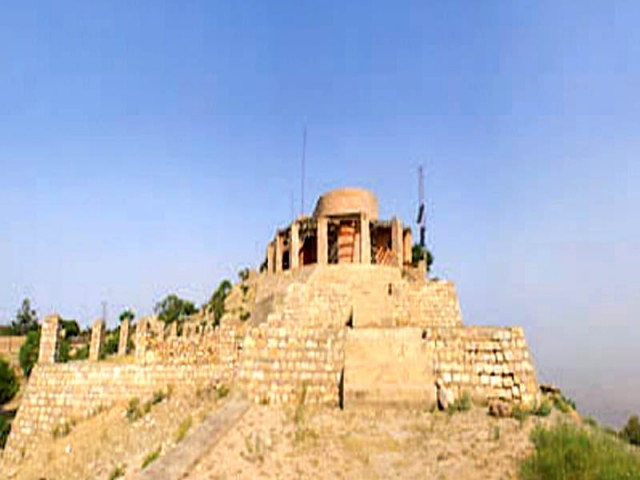Sheikh Badin: The road less travelled
Fancy paying to spend a night in a century-old British prison?

Sheikh Badin: The road less travelled
I discovered this hidden getaway while on a family visit to DI Khan. My cousin, who would often venture out to Sheikh Badin on a bike — there are no paved roads on the last leg of the journey — suggested that we take a day trip there. And, the very next day, we were on the road.
The resort lies at an altitude of 1,400 metres above sea level, and to get there the two of us took the Indus Highway from DI Khan to Peshawar, reaching the foothills of Pezu some two hours later. The road beyond the Pezu foothill has been inaccessible to vehicles other than motorcycles and four-wheelers, and locals seem to prefer travelling either by foot or on the sturdy 70s’ Toyota jeeps that serve as public transport.
From the foothills of Pezu, we hired a four-wheeler that took us up the rough and steep incline in about an hour before finally hitting a winding path that we trekked on foot. As we ascended the steep slopes, the city down below became a distant sight and the hot city wind turned pleasant and cool.
Going by the place’s name one would imagine that it lies somewhere in Sindh (since its name is the same as the district of Badin), but it has nothing to do with our southernmost province. It is said that the hill of Sheikh Badin was named after Hazrat Bahauddin Zakariya, the great sufi saint of Multan who travelled to this town in order to preach Islam. Others believe that the hill is named after Pir Sheikh Bahauddin, whose tomb is built on the hilltop and attracts devotees from the vicinity all year round. Later, the name was shortened from Sheikh Bahauddin to Sheikh Badin. And so a place that has nothing to do with Badin got a name closely resembling it.
Sheikh Badin is perhaps not on the radar of domestic tourists, who instead flock to the Northern Areas for a vacation. But the British, who were known not to have let any hill station go unused, spotted this unlikely town and promptly set up shop. They arrived at Sheikh Badin somewhere around 1861 and set up a cantonment to entrench their presence. It is said that the station did not have a water supply at the time, but the British weren’t going to let such a small detail deny them a hill station. They promptly built four small reservoirs with channels of mountain stream water feeding into them. And to chill their drinks for the essential summer retreat experience, they converted a well next to the pools into an ice storage facility. Apparently, they also came up with some 19th century technique of filtering the water, but that’s been lost to antiquity since.
The present-day town, however, is somewhat underdeveloped. Upon reaching the cool hilltop, I discovered that it has only one rest house, known as the Daak Bangla, which was built more than 100 years ago. It comprises a few rooms with a vista view of the mountains, but I opted to take in the breathtaking view of the Pezu Mountains from a charpoy laid out in the veranda. Antique furniture and other accessories are still in use but in a rather decrepit condition. There is only one shop set up by a local that sells cold drinks and snacks, not surprisingly at double the usual price. Drinking water is difficult to find, so it is advisable to take your own.
But perhaps where Sheikh Badin beats every other tourist destination in Pakistan is in offering you your first-ever (hopefully) lock-up experience. Fancy that? Tourists can actually rent prison cells for a night’s stay or camp out in the lawn by paying a small amount to the local caretaker. And they can take their pick from among six small and four large cells, and a jailor’s room — all still in reasonable condition!
I learnt on the journey that there is wildlife in a nearby jungle that includes leopards, jackals, wolves, pheasants and partridges. Locals say that the jungle is being developed into a Sheikh Badin National Park. But would the animals still be there when the park is completed? We’ll have to keep our fingers crossed.
Animals aside, Sheikh Badin is sparsely populated, with only 25 to 30 houses, one primary school for boys and girls and four mosques. They do not have paved roads, hospitals, secondary schools or other basic amenities. The oasis town of Paniala lies in the southeast, while a cement factory is located in the west. Locals complain that the factory spews out pollution that is damaging the local environment and will eventually affect the little tourism that there is.
While the remote little town charmed me, it was saddening that such places are not given priority for development and promotion by the tourism ministry despite their potential as major tourist destinations. Hill stations in Pakistan are mostly synonymous with Murree or Bhurban, places that have an infrastructure in place to receive and accommodate thousands of domestic tourists every year. Sheikh Badin needs improved infrastructure too, in order to popularise it among tourists. There is news that the ministry is planning to build a carpeted road and a Pakistan Tourism Development Corporation motel in Sheikh Badin, along with a chair lift facility from the village of Paniala. But given the government’s record in delivering services, these promises are best not to be taken seriously. In the meantime, the jail awaits.
Published in The Express Tribune, Sunday Magazine, July 29th, 2012.



















COMMENTS
Comments are moderated and generally will be posted if they are on-topic and not abusive.
For more information, please see our Comments FAQ